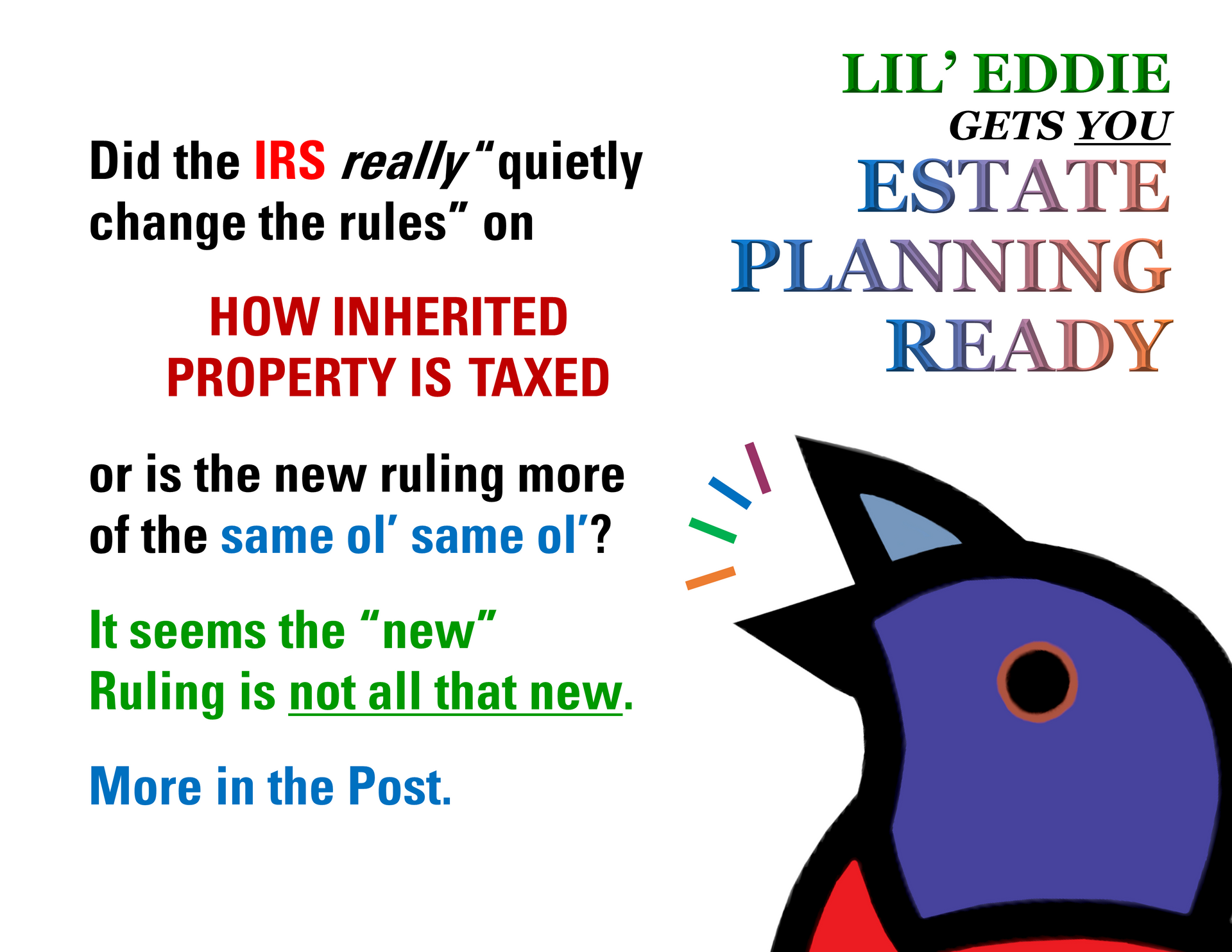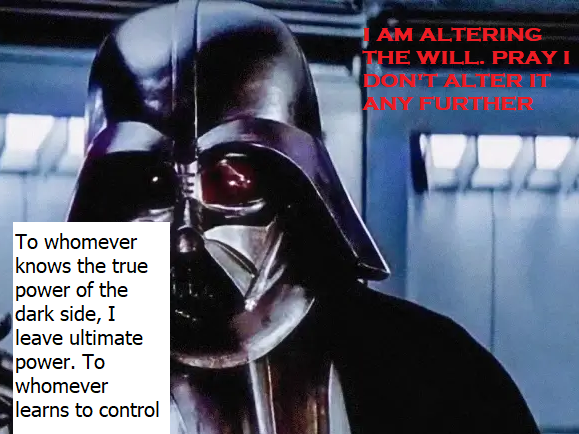The Estate of Darth Vader: Episode II - The Order of Payment
What expenses will your estate pay? What can Luke and Leia expect in dad's estate?
Patience you have learned, young Padawan. We continue our quest to settle Darth Vader’s estate by exploring the expenses Darth Vader's estate must pay before it is distributed to his beloved beneficiaries: Luke and Leia. As a resident of the Connecticut system (just 12 parsecs from the Hoth system), Darth Vader’s estate must pay the claims, expenses, and taxes owed before the estate can be distributed amongst his beneficiaries. There is an order of preference to determine which expenses get paid first, as some creditors are more important than others (take a gander at the statute here, or do not, there is no try).
Woe to the poor creditors at the bottom of this list if the estate is
insolvent, meaning the expenses owed are larger than the size of the estate. Will Darth Vader's estate be
insolvent? Let’s take a look at the Sith Lord's estate and the expenses it pays from the most preferred to the least preferred.

1. Funeral Expenses
At the very top of the list, as the most important expense to be paid, we have payment for the deceased’s funeral.
"Why?", you ask. Funerals are usually planned in a very short period of time, often before the family even looks at the deceased’s estate plan. The family almost always ends up paying for the funeral out of their pockets, not from the estate. Homo sapiens as a species have a strong innate interest in ensuring that the departed are handled promptly, with dignity, and without causing financial hardship for the family. As such, the very first expenses given the highest priority are the funeral expenses for the deceased.
Darth Vader’s estate is unlikely to be burdened by a large funeral expense. His funeral consisted of a simple cremation on the Forest Moon of Endor. There’s music and refreshments, but those are likely not an expense Luke or Leia paid out of pocket since they were piggybacking off the Rebel Alliance’s victory party. As hosts to the ceremony, the Ewoks may have charged a facility fee or cremation fee, but I’m hesitant to say that Ewok society even uses currency. In a pinch, C-3P0 can use his status as their god to negotiate a lower fee with Ewok Chief Chirpa.
2. Expenses of Settling the Estate
Once the funeral expenses are paid, the estate’s assets are available to pay for the expenses associated with settling the estate. These expenses encompass a potpourri of fees including (1) court fees, (2) appraisal fees, (3) accounting fees, (4) bonds, (5) attorney fees, (6) publication fees, (7) fees associated with getting real estate ready for sale…the list goes on and on as it encompasses any and all fees that are related to the resolution of the estate.
Darth Vader’s estate is going to be hit hard by these expenses, unless he did some clever estate planning, such as a Living Trust plan, to help avoid some of the probate process. With several assets in several systems, each system having its own local probate code, there are going to be a litany of fees. With an attorney guiding the estate through each of those probate courts, the expenses are likely to range anywhere from 3% to 6% of the gross assets of the estate.
3. Claims Due for the Last Sickness of the Decedent
The last sickness a decedent had is often what kills them, and it often kills them before they get the chance to pay their medical bills. Such fees are paid after the expenses of the estate settlement are paid, and often hospitals will need to argue about what exactly constitutes an “expense of settling the estate” taking precedence over them, because there may be very few assets left to collect once the settlement expenses are paid. Can the executor add an addition to a property owned by the estate as part of the settling of the estate? Such work can certainly be costly, and may exhaust cash assets, so such repairs must be limited only to repairs which are (1) necessary to conserve the overall value of the estate or (2) ordinary and necessary to preserve the property in question.
Darth Vader had a lot of medical issues, mental health issues too. Being a private person, and one who abhorred the idea of anyone seeing him in a weakened state, Darth Vader self-insured and treated his ailments with his own medical equipment, his personal medical droids programmed- exclusively by him, and his strong connection to the Force. He would be unlikely to have any outstanding medical costs to be paid from the estate.
4. All lawful taxes and all claims due the state of Connecticut and the United States
The government finally gets their due as the fourth priority expense. Taxes owed to the state, taxes owed to the federal government, and claims against the estate by any of those governmental entities need to be paid before the beneficiaries get their slice of the estate.
In Darth Vader’s estate, I envision the estate being completely wiped out at this point. Normally the estate would pay any back taxes owed, estate taxes, income taxes, and every other tax or claim before moving on to the next expenses in the list, but there has been a significant regime change! The Rebel Alliance has formed the New Republic after defeating the Galactic Empire, and priority number one for the New Republic is the seizure of the defeated Galactic Empire’s assets and the assets of its most prominent officials. Since Darth Vader was a war criminal, Luke and Leia should expect the estate to be depleted at this point as the New Republic takes possession of all of Darth Vader’s remaining assets to help rebuild the galaxy, right the wrongs he committed in life, and provide whatever restitution can be had for his victims. Darth Vader’s estate would therefore become INSOLVENT if he had any other expenses to paid, and there are still a few more left in this list!
5. All claims due any laborer or mechanic for personal wages for labor performed by such laborer or mechanic for the decedent within three months immediately before the decease of such person.
Fifth on the list of priorities are the laborers who worked for the deceased within three months prior to death. Got the house painted a month before you died? That painter gets paid at this point. Got the car fixed four months ago? Sorry car mechanic, you’ll have to wait until we’re a little further down the list.
Unfortunately for Darth Vader’s workers, there are no assets left in the estate to pay them for their hard work. The debt he owed them in life goes away because there’s simply no money left to pay for it in the estate following the New Republic’s claim against the estate. Sorry folks. Next time you enter into a contract with a Sith Lord, demand payment up front!
6. Other preferred claims
A seemingly subjective term, “other preferred claims” refers to claims from creditors which are considered more important than others. It depends on the circumstances of each case and can include expenses such as (1) mortgage loans, (2) unpaid child support, (3) benefit recovery, (4) promissory notes, and (5) good ol’ fashioned credit card debt, so long as the court agrees such claims are “preferred.”
Sorry Darth Vader’s preferred creditors. You may as well be a regular, lowly, non-preferred creditor at this point because there is nothing left to claim from the estate.
7. All other claims allowed in proportion to their respective amounts
At the end of this list, we have all the other claims against the estate. Non-preferred creditors now get their slice of the pie. If there isn’t enough left in the estate to pay everyone in this non-preferred group what they are fully owed, the remainder is divided pro rata amongst the creditors, meaning the higher the amount owed to you, the higher percentage you get of whatever’s left.
Darth Vader’s estate couldn’t even pay preferred creditors. You think you stinking non-preferred creditors have a chance? Go chase yourself around the galaxy you non-preferred scum.
And there you have it! These expenses must be paid by the estate before the beneficiaries can get their share. Unfortunately for Luke and Leia, Darth Vader’s estate was insolvent because of his terrible misdeeds and the installation of the New Republic as the authority controlling the galaxy. Knowing Luke and Leia though, they are alright with that and prefer to see justice done.
For future articles exploring Darth Vader’s estate, we’ll assume he had a little something left to divide amongst his children. Let’s see how Luke and Leia deal with an inheritance in The Estate of Darth Vader: Episode III – The Intestate Menace.
Be sure to check out:
The Estate of Darth Vader: Episode I - The Estate of the Sith Lord
The Estate of Darth Vader: Episode III – The Intestate Menace
Quick Links
Services
Get in Touch
Phone: 203-951-5435
Address: 1480 Boston Post Rd, Old Saybrook, CT 06475, United States of America
All Rights Reserved | Ed Lowe Law, LLC





